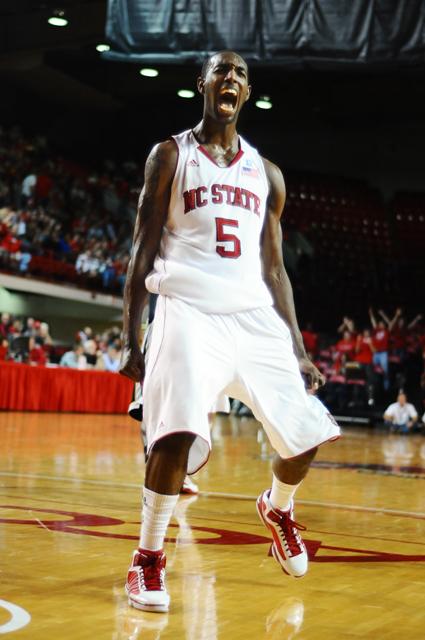Tuesday afternoon, sophomore men’s basketball forward C.J. Leslie posted the following anti-gay comments to his Twitter.
“I’m no anti gay But I would rather not have a gay n the locker room.”
“John amaechi is to big to be gay…….#imjusssayin”
“I’m not saying I hate gays but that’s sumthing that I would not wnt n my locker room…..”
Despite Leslie’s initial statement that he is “no anti gay,” his comment is already raising red flags in the N.C. State community.
Annabelle Myers, assistant athletics director for media relations, said Leslie’s statement should not be viewed as a reflection on the University’s relationship with the GLBT community.
“This is someone’s personal opinion, so it doesn’t have anything to do with N.C. State athletics’ or N.C. State’s opinion on the subject,” Myers said.
Although Myers said the University has no legal grounds to control what Leslie—or any other player—posts to any social media site, student-athletes are reminded to be cautious with their comments.
“Someone has a right to say what they want to say, but we also have to remind our student athletes that they are representing more than themselves,” Myers said. “Legally we can’t tell them they can’t tweet, but we ask them to circumspect what they put out there.”
However, while Myers said this is a topic addressed by the coaches, some athletes struggle with being in the public eye.
“There is a social media policy for student-athletes. Players are reminded that they have followers and it is public, and it not only reflects on them, but the program as well,” Myers said. “What they post is not just something they say personally to their friends, and I think they sometimes forget that.”
N.C. State’s student-athlete policy for the use of social networking sites is similar to Myers’ comment, reading that athletes have a right to free speech—but it is a limited right as a result of their status.
“As a public institution of higher education, N.C. State University supports and encourages its student-athletes’ rights to freedom of speech, expression and association, including the use of social networks,” the policy reads. “Nevertheless, as representatives of the University, student-athletes are held to a higher standard and are role models. Playing and competing for N.C. State is a privilege, not a right. In this context, each student-athlete has the responsibility to portray him or herself, the team, and N.C. State in a positive manner at all times.”
According to Justine Hollingshead, director of the GLBT Center, said Leslie should have said something different if he meant something different.
“When you use social media, it is very damaging because it becomes viral. In a matter of hours, one comment has now become something that people all over the world will see. It reflects on the University, the new coach and the basketball team,” Hollingshead said. “Not only does the comment need to be addressed by the basketball coach and the athletic department, it’s definitely an area we want to address as a community to be sure every athlete feels they are accepted on campus and that they aren’t treated differently. Because if you were a member of any N.C. State sports team struggling with your sexuality, you certainly wouldn’t come out now.”
Hollingshead said Leslie’s comment is both an affront to many students within the University, but also to student-athletes who are members of the GLBT community.
“Leslie’s clueless to think that there aren’t members of the GLBT community involved in N.C. State athletics as well as in teams from other universities,” Hollingshead said.
According to Hollingshead, if the University does not actively stand against these comments, and others like them, it will reinforce homophobic behavior, even encouraging it.
“It needs to be addressed immediately, and the University needs to take a really strong stance. These comments may seem benign, but this one comment could then lead to the next person who says ‘well I hate fags’ and then the next person may actually act on it,” Hollingshead said. “The University needs to say that this is not acceptable in any form. They need to be vocal and transparent about this, and that this type of behavior won’t continue.”
Hollingshead said she encourages Gottfried and other people in the athletics department to sit down with their players and faculty members to discuss this issue, so that these comments will not continue to plague the University.
“If no one tells [Leslie] the comments are unacceptable and certainly not welcoming, it will set up the notion that it’s OK, and it perpetuates that homophobia. People will think ‘If CJ Leslie said it, or XYZ person said it, then it must be OK,'” Hollingshead said. “He needs to know from coach Gottfried that this comment is not acceptable, and that it’s not the environment or the climate we want to create on campus, particularly in an environment—athletics—that’s already homophobic.”
Ultimately, Myers said while the University does not support Leslie’s comment, this would be handled by the basketball coach, Mark Gottfried.
Athletics Director Debbie Yow and recently hired men’s basketball coach Mark Gottfried were both unavailable for comment.








